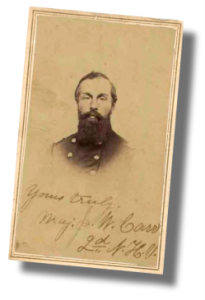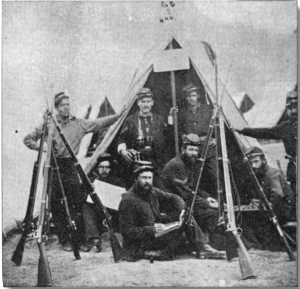Research Arsenal Spotlight 9: James Webster Carr of the 2nd New Hampshire Infantry

James Webster Carr initially served as Captain of Company C, 2nd New Hampshire Infantry. By the end of his three-year term of service, he would be promoted to Lieutenant Colonel of the regiment, though his letters indicate that he was acting in that capacity far earlier than his actual promotion. James Webster Carr was born in New Hampshire, but he and his wife were living out west before the outbreak of the war and he returned to New Hampshire to serve.
In the Research Arsenal collection, we have 9 letters written by James Webster Carr and his wife, Jane Dorothy (Goodhue) Carr, all of them sent to a friend of theirs in Illinois, William Penn Canton. Through these letters, they show their opinions on the war as well as details of the battles James Webster Carr fought.
James Webster Carr and the Outbreak of the Civil War
James Webster Carr’s first letter in the Research Arsenal collection was written on March 11, 1861, a full month before the outbreak of the war, though it was clear from his letter that he expected it to begin soon.
Writing about the politics of the time and possibility of southern succession, James Webster Carr said:
“Our annual town meetings come off tomorrow all through the state. I think ‘Old Abe will win.’ As far as secession is concerned, I wish that all the slave states might be set off together so that we might have a free country if t’was not so large. In regard to fighting the South and “whipping them into the truces” as they tell about, I have not much courage for that (not but what they deserve it and I should like to shoot some of them well enough). But it would be fighting to gain just what I want to get rid of, so all I can do is to hope and pray that they will stick to secession and that the border states will join them and that finally a convention of all the states will be called and vote them out of the Union. But I fear that war is inevitable and that we shall see bloody times.”
James Webster Carr also had gloomy prospects about a Union victory should war come:
“In case of a war, I should not be surprised if the South were victorious at first if not in the end, for they will be fighting for what they call liberty and for their homes, while our soldiers will be as the English were in the [American] Revolution, fighting for pay. If war comes, we must not let the regular paid army do the fighting but must arise one and all and strike for real liberty now and forever to all mankind or there is no use in fighting at all.”
James Webster Carr’s next update came in a short and terse letter written several days after the First Battle of Bull Run, in which the 2nd New Hampshire Infantry took heavy losses. He wrote:
“Have had a very hard battle and a harder retreat. But it has pleased the Lord to keep me safe. Have lost from my company 13 men in missing and wounded. The Colonel [Gilman Marston] & one Captain was all the commissioned officers that were wounded in our regiment. About 100 wounded & missing in 2nd New Hampshire Volunteers.”
Recruiting Service for the 2nd New Hampshire Infantry

After the First Battle of Bull Run, James Webster Carr returned to New Hampshire to work on recruiting more men for the 2nd New Hampshire Infantry. In a letter from Bladensburg, Maryland on September 22, 1861, James Webster Carr wrote:
“I have a full company now. I succeeded in getting 215 recruits in New Hampshire and have them all here now and one regiment is in good shape and the brigade is considered one of the best now in the field. We have the best arms. One company with Sharps rifles; the rest [carry] the new Springfield rifle minié ball &c.”
He also revealed the weapon he procured for himself:
“I have bought me a Sharps breach-loading carbine. Paid 42 dollars for it as I came through New York. Mean to sling it on my shoulder the next battle we have and if a few of those rebels do not bite the dust, t’will be because they kill me first.”
Increased Duties in the 2nd New Hampshire Infantry
In the Winter of early 1862, James Webster Carr’s wife, Jane, provide a couple of short updates about her husband’s condition, revealing more of the hardships he was facing than he typically mentioned in his own letters. On January 5, 1862, she wrote:
“James was not very well when he wrote. Had been threatened with a fever and I am somewhat worried about him for fear he will have the typhoid fever. He is such a fever subject and he has lost a number of his men by it within a short time. I do not believe it is a healthy place where they are now.”
In her next letter on February 23, 1862, she added:
“The mud is so deep where they are on the Potomac now, they can only exist and so much damp weather is not very wholesome, but James writes as though they were in good spirits and rejoicing at the good news they hear every day from other quarters of the army. They long for the mud to dry up so they can cross [the Rappahannock] and have one more battle where they can say they did not run. I want it to come so that it may be over but still dread it for fear he may get killed.”
Writing February 11, 1863, James Webster Carr detailed his extensive experience in the regiment up to that point.
“I have been in fourteen battles. There [has] never been any part of our regiment engaged either in skirmish or battle but what I have been one of the number. I commanded the line of advance at the 2nd Fair Oaks or Seven Pines, Va. [On the] 23rd June, I was the only captain with our regiment at Malvern Hill [on the] 1st [of July], and there was but one other at Malvern Hill [on the] 2nd when the gallant Jo. Hooker took us up and down the Rebels from the hill a few days before we left Harrison Landing. But some of those captains that took their leaves and traveled during the Seven Days before Richmond managed to get home and get promoted into some of the new regiments then forming and were bold enough to say that they had been in every battle on the Peninsula &c. &c.
I led the regiment out on a 3 day raid to destroy the Rappahannock Railroad Bridge last week. We were successful. Lost only one man. They all respect me and fear me as much as I care to have them. They know I will fight. I used a carbine (Sharps) all the time. I led the company at Fredericksburg. I shot 60 rounds from a Springfield rifle musket while skirmishing on Sunday. I have killed as many of them as I want to if they will lay down their arms. If not, some more of them must die or they must kill me. I do not deem this childs’ play by no means, nor want them handled with gloves on.”
Because of his extensive experience, James Webster Carr expected soon to receive a promotion to Lieutenant Colonel:
“Col. Marston is at Washington D. C. in Congress this winter. We have no Lt. Col. and Major Bailey is now and has been for some time put under arrest for alleged disobedience of orders so I have command [of] the regiment, being the senior captain.
I have been detailed since January 1st to act as Lt. Col. while Major Bailey acted as Colonel. Now I am at the top of the heap in command but not in rank. Col. Marston is a brigadier at any time he chooses to leave the House and take the field. Then I expect my commission as Lt. Col. unless they dismiss Major Bailey or he should resign. Then I expect to be Colonel and shall be or leave the service for I have been all the time on duty and for 8 months have done field officer duty and 6 of the time, taken care of my company too.”
James Webster Carr received his commission as Lieutenant Colonel two months later, on April 13, 1863. He went on to lead his men at the Battle of Gettysburg, where he had his drawn sword shot from out of his hand. He was discharged with his regiment on June 21, 1864 and went on to become a lumber dealer in Grand Rapids, Michigan until his death in 1875.
We’d like to extend a special thanks to William Griffing of Spared & Shared for his work in transcribing and sharing these letters.
The full collection can be viewed with a Research Arsenal membership.
Check out other spotlight collections like Asa Frank Chester of the 20th Illinois Infantry and David King Perkins of the USS Seminole.

